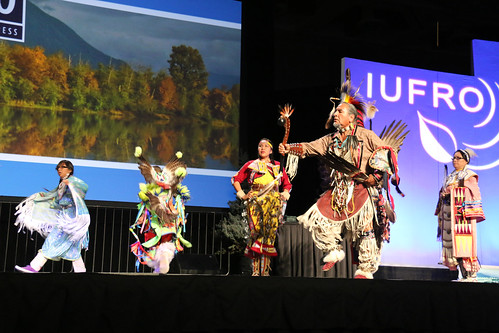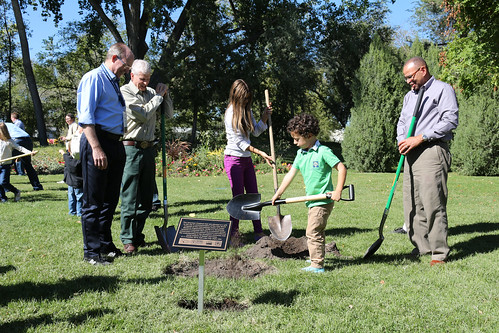
Nino Reyos and Twoshields Production Co. perform native dances for the opening ceremony at the International Union of Forest Research Organizations in Salt Lake City. (U.S. Forest Service)
Confronting climate change will be substantially cheaper and easier if we conserve forests, and the key to that is expert knowledge and science, Undersecretary of Natural Resources and the Environment Robert Bonnie told thousands of attendees at the recent 24th World Congress of the International Union of Forest Research Organizations in Salt Lake City, Utah.
“A healthy and prosperous planet depends on the health of our natural resources and, in particular, on the conservation of the world’s forests,” Bonnie told the crowd, which included 2,492 delegates from 100 countries. “But our success in conserving, managing and restoring our forests depends to a significant degree on a solid foundation of science and research.”
Bonnie served as the keynote speaker of the World Congress, the largest in the U.S. for foresters and scientists. Among attendees were 700 students and an additional 1,300 professional foresters, who joined them for the annual conventions of the Society of American Foresters and Canadian Institute of Forestry.
Founded in 1892, the International Union is a global nonprofit and non-governmental scientific organization dedicated to promoting international cooperation in forest-related research. The International Union’s World Congress is held every four to five years, and the last time the U.S. hosted this prestigious event was in 1971.
Around the world, forests and trees play a critical role in supporting livelihoods and quality of life. Forests provide clean water and clean air, habitat for fish and wildlife, settings for outdoor recreation and solitude, as well as raw materials for forest products and bioenergy. However, even as our demand for their resources grows, forests and trees face myriad threats, such as climate change and invasive pests and diseases. The theme of the Congress, “Sustaining Forests, Sustaining People: The Role of Research,” emphasized the importance of scientific research and crosscutting collaboration to help find solutions to these challenges.
Bonnie pointed to the legacy of President Theodore Roosevelt and Gifford Pinchot, the first chief of the U.S. Forest Service when referring to the nation’s challenges. When Roosevelt and Pinchot founded the Forest Service in 1905, Bonnie said, they were influenced by the loss of a seemingly endless bounty of forests and other natural resources in America.
“The founding of the Forest Service . . . was guided by a progressive vision that sought to apply science to societal challenges for the benefit of all Americans,” he said. “Expert knowledge and science were at the core of Roosevelt’s and Pinchot’s vision.”
Bonnie emphasized the need for scientists to understand their role in bettering the world’s forests, including through scientific exploration such as on the Forest Service’s Escambia Experimental Forest in Alabama, a living laboratory that played a vital role to help restore the longleaf pine. The U.S. was once covered with 90 million acres of longleaf forests, which at one point dwindled to just 3 million acres.
“When I was a boy, I spent vacations with my grandfather on my family’s land in South Carolina. When my grandfather wanted to restore longleaf pine in the 1950s and 60s, he was told that the tree was difficult to plant and wouldn’t grow,” he said. “Today, longleaf covers over 4 million acres and, thanks to many this magnificent ecosystem is on the rebound.”
Research led the way with reforestation, restoration, silviculture systems and fire ecology were all studied at Escambia and became critical to the resurgence of the longleaf pine, Bonnie said. He added that as we look to the future, climate change, population growth and invasive species will make it harder to predict the outcome of forest management decisions.
“Uncertainty will complicate our decision making. But in a very real sense, we’ve been here before,” he said, referring to Pinchot’s early work. “So as managers and policymakers wrestle with the difficult decisions we face about the future of the world’s forests, science and research will light the way.”
Highlights from the World Congress are available on the International Union’s YouTube channel, where recordings of major ceremonies, keynote plenaries and exclusive interviews are shared.
The Forest Service Research and Development website offers more information about the agency’s work at the forefront of science to improve the health and use of our nation’s forests and grasslands.

From left to right: Mike Wingfield, the new president of International Union of Forest Research Organizations, U.S. Forest Service Chief Tom Tidwell and Jim Reaves, Forest Service deputy chief, watch as two children prepare to plant a tree. (U.S. Forest Service)
No comments:
Post a Comment
Note: Only a member of this blog may post a comment.